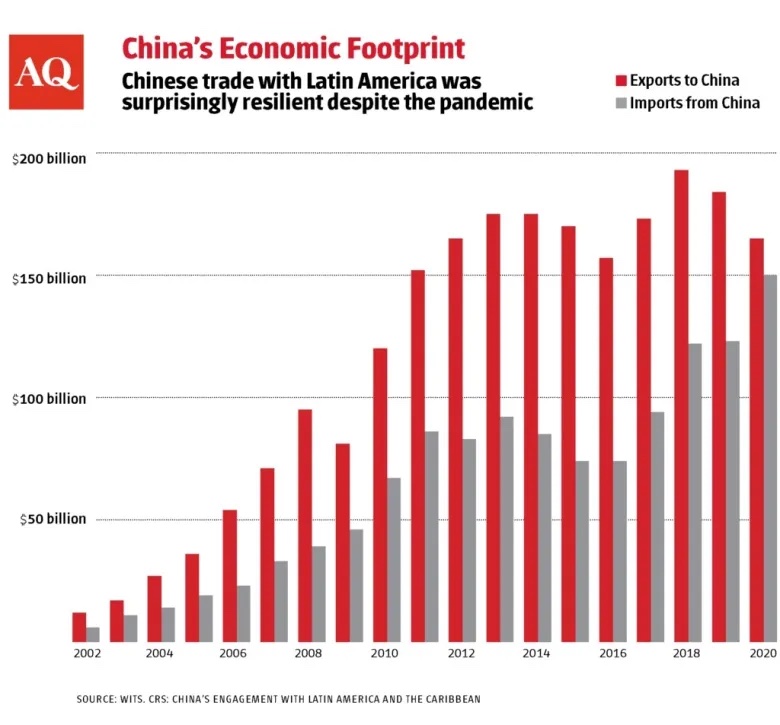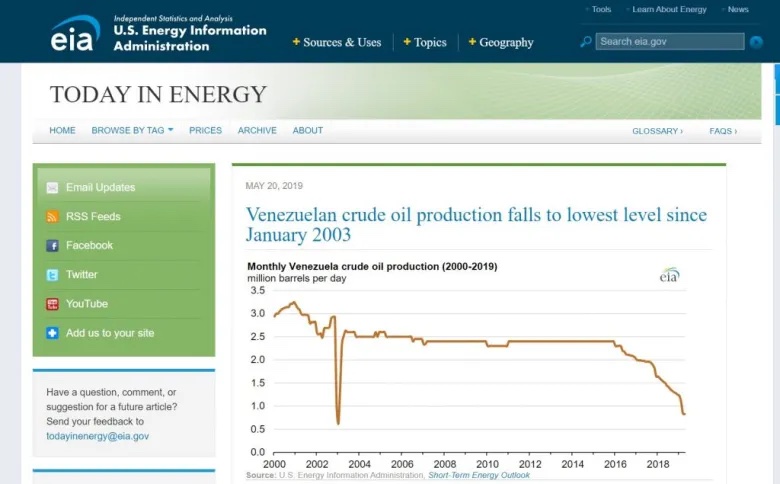
China deepens ties with Venezuela, challenging US ‘hegemonic mindset’
Venezuela’s President Nicolás Maduro took a historic trip to China this September. There, the two nations signed 31 comprehensive agreements and formally “upgraded” their relations to an “all-weather strategic partnership”, one of Beijing’s highest designations.
China and Venezuela jointly blasted the “hegemonism” of the Western powers. Beijing formally condemned the illegal sanctions that Washington has imposed on Caracas.
Chinese President Xi Jinping emphasized this his government will “firmly support” Venezuela’s “just cause against external interference”.
The global political and economic order is changing rapidly.
One of the biggest shifts the world has seen in the past 20 years is in relations between China and Latin America.
At the beginning of the 21st century, there was not much trade between China and Latin America. But in the past two decades, their economic relations have skyrocketed.
Today, China is the second-largest trading partner of the region, after the United States. There are nine countries in Latin America that trade more with China than any other nation. (The United States is Mexico’s biggest trading partner, and Mexico has the second-biggest economy in Latin America. But if Mexico is excluded from the data, China becomes Latin America’s top trading partner.)
Among the Latin American nations that already trade more with China than the United States are the largest economy in the region, Brazil; as well as the third biggest, Argentina; along with one of the world’s top lithium producers, Bolivia; the second-largest copper producer, Peru; and the country with the biggest known oil reserves: Venezuela.
 Venezuela has a lot of economic potential, but has suffered for years under a brutal economic war waged by the United States.
Venezuela has a lot of economic potential, but has suffered for years under a brutal economic war waged by the United States.
In 2019, the Donald Trump administration launched a coup attempt. Washington claimed a little-known right-wing opposition politician, Juan Guaidó, was the supposed “interim president” of the country, despite the fact that he had never participated in a presidential election.
The United States pressured countries around the world to recognize Guaidó as the supposed leader of Venezuela.
At the same time, the United States imposed upon Venezuela one of the most grueling sanctions regimes in history.
Washington’s goal was clear: to destroy Venezuela’s oil sector, thus starving the leftist government of revenue and leading to its overthrow.
 For a century, ever since oil was discovered in Venezuela, the South American nation’s economy has been extremely reliant on one industry: oil.
For a century, ever since oil was discovered in Venezuela, the South American nation’s economy has been extremely reliant on one industry: oil.
This over-dependency is a problem that predates the Bolivarian Revolution declared by revolutionary socialist President Hugo Chávez at the turn of the 21st century.
Long before Chávez was born, Venezuela has been a petrostate. The government has historically relied on exporting oil to get revenue to fund social programs. This was the case even when the state was controlled by right-wing political parties.
The US sanctions on Venezuela began in 2015, when the Barack Obama White House issued a bizarre executive order “declaring a national emergency with respect to the unusual and extraordinary threat to the national security and foreign policy of the United States posed by the situation in Venezuela”.
When Trump entered office in 2017, he drastically escalated the economic war on Venezuela that Obama had started into a full-on embargo (like the blockade Washington has illegally imposed on Cuba for more than six decades).
US sanctions have devastated the Venezuelan economy. According to the top United Nations expert on the issue, special rapporteur Alena Douhan, Washington’s unilateral coercive measures, which are illegal under international law, resulted in the Venezuelan government losing 99% of its revenue.
Independent experts have reported that US sanctions have caused at least tens of thousands of civilian deaths in Venezuela, perhaps more than 100,000.
While it is widely known that Venezuela has the world’s largest oil reserves, what is much less known is that the South American nation’s crude is very heavy.
Venezuela’s oil needs a lot more processing than the lighter crude of other countries. It must be diluted, blended with lighter crude or liquids like naphtha.
US sanctions have aimed expressly at trying to prevent Venezuela from importing the diluents it needs to process its oil. This was yet another part of Washington’s strategy to destroy Venezuelan oil production, to starve the government of revenue.
 However, the numerous US coup attempts have failed. Still today, Venezuelan President Nicolás Maduro is firmly in power. He continues the legacy of the Bolivarian Revolution that was initiated by his predecessor, Chávez.
However, the numerous US coup attempts have failed. Still today, Venezuelan President Nicolás Maduro is firmly in power. He continues the legacy of the Bolivarian Revolution that was initiated by his predecessor, Chávez.
Maduro is also deepening Caracas’ alliance with Beijing.
This September, the Venezuelan leader took a seven-day trip to China, which both Beijing and Caracas described as “historic”.
Maduro met with Chinese President Xi Jinping and signed 31 comprehensive agreements, involving collaboration in a wide array of areas, including economic integration and trade, geology and mining, health, technology transfer, construction of public housing, energy, infrastructure, telecommunications, and even outer space.
During Maduro’s trip, Xi also announced that China had “elevated” its diplomatic relationship with Venezuela.
Beijing previously considered its ties with Caracas to be part of a “comprehensive strategic partnership”. Now, China calls it an “all-weather strategic partnership”.
This means that Venezuela is among China’s closest allies, at the same level as Pakistan, which is one of China’s neighbors and plays an important role in the Belt and Road Initiative, Beijing’s global infrastructure project.
In his remarks upon meeting with Maduro, President Xi said that “China will continue to firmly support Venezuela’s efforts to safeguard national sovereignty, dignity and social stability, as well as its just cause against external interference”.
China and Venezuela released a joint statement calling to “oppose all forms of hegemonism and power politics, oppose all forms of unilateralism”.
Beijing-based newspaper the Global Times, which is close to the government, described Maduro’s trip writing: “The further consolidation and elevation of bilateral relations also suggests the irreversible momentum of South-South cooperation, which leads to win-win results and unity among the developing world rather than certain Western countries wrestling for power out of a hegemonic mindset”.
For his part, Maduro said the two nations’ growing relations are part of a “new era”. He added, “We have a relation of deep friendship, of successful cooperation. Our relations have been a model for the Global South”.
The Venezuelan president added that China has been the “great motor of development in a new era of a multipolar and pluricentric world”.
Maduro emphasized that the partnership between Venezuela and China is “not about dominating countries, much less taking their resources or wealth. On the contrary, we are working for the development of industry, agriculture, technology, the capacity to make jobs and satisfy the needs of the peoples. It is the century of a different world, pluripolar and pluricentric”.
China has the world’s largest economy, when its GDP is measured at purchasing power parity.
China is also the world’s biggest importer of both oil and gas. It needs stable, reliable energy partners, particularly as Washington pressures countries to minimize their relations with Beijing.
Venezuela not only has massive oil reserves, but also very significant gas deposits.
BP reported in 2021 that Venezuela has proven gas reserves amounting to a staggering 6.3 trillion cubic meters, larger than those in Saudi Arabia (6 trillion), the United Arab Emirates (5.9 trillion), and Iraq (3.5 trillion).
In recent years, the Venezuelan government has slowly expanded exploration, looking for more gas fields.
China is slowly trying to end its reliance on fossil fuels. Beijing recognizes that climate change is a very serious threat, not only to the planet, but to its own national security.
In fact, China is the world’s leader in renewable energy, representing more than 80% of global clean energy manufacturing investment.
Beijing is on the path to install more solar panels in 2023 than the United States has installed in the history of the technology.
But, in the short- to medium-term, China still needs a lot of oil and gas, and Venezuela is a natural energy partner, with a government that Beijing can rely on not to betray it and ally with Washington.
Maduro’s trip to China came just a few weeks after a historic summit of the BRICS, in which the bloc founded by Brazil, Russia, India, China, and South Africa formally invited six countries to become new members: Argentina, Egypt, Ethiopia, Iran, Saudi Arabia, and the United Arab Emirates.
Venezuela has formally applied to join the extended BRICS+ bloc as well.
China has publicly endorsed Venezuela for membership. Brazil, under President Lula da Silva, has also made it clear that it supports Venezuela joining BRICS.
The fact that Iran is now integrating into the bloc shows that countries in the Global South are increasingly willing to challenge the illegal unilateral sanctions imposed by the United States.
In fact, in July, Iran also became a full member of the Shanghai Cooperation Organization, an important institution for security policy in Eurasia. Other members include China, Russia, India, Pakistan, and numerous Central Asian nations.
China has deepened its alliance with Venezuela mere months after helping to broker a historic peace breakthrough between Iran and Saudi Arabia.
For decades, the United States pressured Riyadh to wage a proxy war against Tehran, in hopes of weakening and eventually toppling Iran’s post-revolutionary government.
Today, Iran and Saudi Arabia certainly are not allies, but they have normal diplomatic relations and will work alongside each other members of BRICS.
Developments like these show that, while the United States wages wars and seeks to overthrow governments across the planet, China encourages peace, diplomacy, and stability, in the name of “win-win cooperation” and mutually beneficial economic development.


